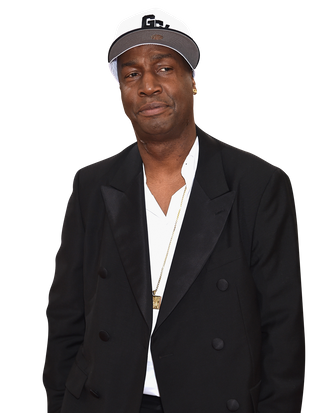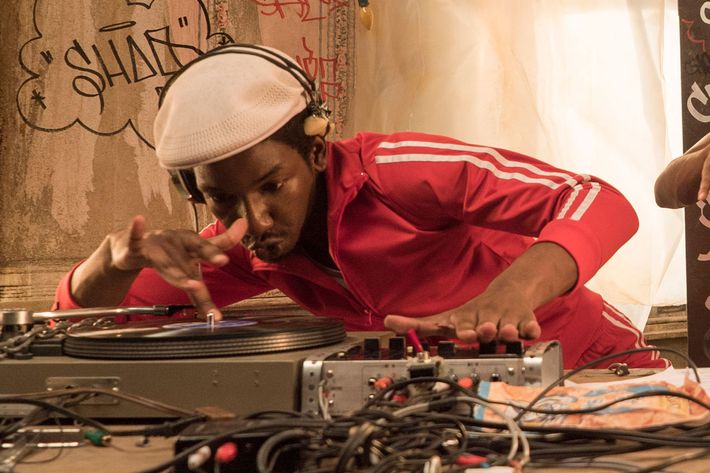
When renowned DJ Grandmaster Flash was growing up in a group home in the Bronx in the ‘60s and ‘70s, he got a kick out of taking apart electrical appliances: his sister’s hair dryer, the table radio, or his father’s stereo. But the trouble was, Flash — or Joseph Saddler, as he was then known — didn’t know how to put any of it back together. “I became public enemy No. 1 in my house!” he says, laughing, during a recent interview with Vulture. His foster parents solved the problem by enrolling him at now-closed Samuel Gompers High School to study electrical engineering.
There, he learned all about cyclical generators and Ohm’s law. But the training wasn’t fulfilling his true passion, which he first discovered as a toddler handling his father’s vast vinyl collection. So Flash, today considered one of the founding fathers of hip-hop, decided to use his engineering training to change the way music was played. “I was in search of something. I didn’t have a plan. All I knew was that the drop rate was the most important part of a record, be it a white record, a black record, a foreign record, an American record,” he explains. “I had to figure out a way to make perfect harmony with all these different genres of music, in one track.”
Eventually, Flash came up with his famous “quick-mix theory,” a formula based on science and math — “two hated subjects for most people.” Without picking up the tonal arm of the record player, and instead placing his fingers on the vinyl to gauge a record’s revolutions, Flash was able to identify a ten-second drum beat that he would manually edit from one drum solo to another, across songs and genres — extending the beat, so that eventually an MC could rap over it. “Everything then was based on what the DJ was playing,” he says. “I came up with a system to manually take a drum break — a drum solo in most records were like ten seconds — so I had to come up with a way to take duplicate copies of a record and seamlessly take ten seconds and make it ten minutes. Once I was able to do this, I changed the way DJs played records.”
Flash, 58, gave this funky break its own name: “the get down.” Now that signature serves as the title for a new Netflix series premiering on Friday, for which Flash is an associate producer. Created by Baz Luhrmann, The Get Down is set in the South Bronx in the late ‘70s, when New York City was on the verge of bankruptcy and the borough’s youth were in the midst of a music, art, and fashion revolution. Flash spoke to Vulture about working on the series as a consultant and producer, sharing his music for the show, and working with Mamoudou Athie, who plays him.
Let’s talk about the music on the show and how you used real songs from the ‘70s, but also composed new ones — Donna Summer was a real artist. But Missy Holloway, who’s mentioned a lot in the first episode, is fictional. What was the thinking behind those decisions?
How music is decided is this: Baz will sit down with me or Elliott Wheeler, who is our music director, and say, “Flash, we don’t want to make the typical score that is done with pictures. We want you to go into your musical crates and give us some of the heat you played back in the ‘70s, or give us a list and tell us what were the big songs.” Donna Summer was gigantic at that time, but also the Incredible Bongo Band’s “Apache” was big for us. The “Pakoussa” [a remix featured in the pilot episode] defines that special record that only 50 copies were made of, because there were a lot of songs back in the day that were the same thing. If you didn’t have two copies of a certain record, you was wack and the word would go out, and sometimes we would have to go find a copy in England or in the Bronx. And what Baz was trying to characterize with the “Pakoussa” is, we’re going to make this a “Pakoussa” record.
So the “Pakoussa” is not a record from back in the day, but it stands for something?
It wasn’t a real record. What Baz wanted to get across was that in our time, there were those special records that very few were printed of. The “Pakoussa” just represents a definitive type of special record.
I love disco, and I kept wondering how come I’d never heard that song.
That’s the thing about this project. We want to put things in there that people want to sample. I sat down with Elliott for a period of time and said, “Yo, listen, this shit needs to be where people want to buy the film and DJs want to steal this or steal that.” ‘Cause a lot of our songs we had to steal from soundtracks, like Shaft in Africa, because it was so fucking hot. So, I understand what you’re saying. It’s great.
Is that the only song that wasn’t a real song from the era?
Most of the songs are from my crates. Baz and Elliott didn’t want to make this the typical thing. So, when he came to me and asked for my crates, I thought, I don’t let just anybody go into my collections. And then Baz said, “Flash, could I get some of your secrets?” I was like, “Uhh, Baz.” He didn’t want typical scoring in scenes where things happen — he wanted a jam in there. And the thing about Baz is he finds a way to DJ pictures. So some of the pictures have this beat so you’re actually jamming while you’re listening. I said, “Oh shit, he took my beat and he glued it to this picture.” I think this thing he did was unprecedented. This has never been done.
How did Baz finally convince you to open up your crate?
After six months, I trusted him. I was like, “Baz, whatcha need?” Baz or Elliott would call me and say, “We have a scene, what do you think?” And I’d say, “Alright, okay, Babe Ruth, ‘The Mexican,’ fits there,” or, “Sly and the Family Stone, ‘Sing a Simple Song,’ fits there.” And then I’d get a call back a couple of days later: “Oh my God, it works!” Some of the scenes that I gave him information about, although it lived through the character, with the music, I already knew what would work there. But Baz being so attentive and Elliott being so understanding, they took my word for it, so it was kind of cool to take my beats and slide it into this scene or into that scene.
When you were that kid in the Bronx, did you ever imagine this level of success — that someday someone would want to make a TV show about you and your creativity?
Never. Ever. This is a second blast. Before this, journalists used to ask me if I thought the music would ever leave the Bronx. And I would say, “Well, I was hoping it would at least go to Philadelphia.” That’s about as far as I thought. Almost 50 years later, I’ve traveled the planet. I leave for London tomorrow to play a private party for the CEO of Google. It’s ridiculous. It’s such a blessing.
How closely did you work with Mamoudou Athie, the actor who plays you? I understand he had never touched turntables until he met you.
That was a joke between Baz and me for a while, because I came in as a consultant and then I became an associate producer, and then, in passing, Baz comes in and says, “I want to talk to you, Flash. I want to make you a character.” And I’m like, “The fuck you talking about Baz?” And he said, “Yeah, I want to make you a character, but before I consider that, I need to find somebody who can play you.” A month later, he says, “Come down to the shop, got somebody I want you to meet.” I walk in the room and I stop and I freeze and I look at this kid and the first thing I asked was, “What’s your mom’s name?” [Laughs.] This dude looked just like me. And he says, “Grandmaster, I want to do whatever it takes. I know I can’t learn all of your techniques that you created, but I will do whatever it takes to learn so that I please you in the scenes that I will be in.” And I said, “Listen, I’m really hard, most people don’t want me to teach them. I’m really hard, I’m kind of arrogant if you’re getting it wrong.”

Baz had this neighborhood that he bought, where he does his huge scenes. And this neighborhood that he bought in New York has a little house. He said, “Flash, that’s going to be yours and Mamoudou’s house. We’re gonna set this house up, we’re stuffing the refrigerator for you guys to eat, and we’re gonna set up a pair of turntables, and that’s where you’re going to teach them.” Mamoudou meets me there and we go through it and I’m saying to Mamoudou, “Remember this, remember this.” And he does it over and over and over and over again. I put him in front of the turntables and I tell him how it works. At first I’m screaming at him: no, no, no, no, no. Time goes on, he gets better. And then a couple of months down, he calls me and says, “Come to the turntable house.” So I go to the house and he got it! I gave him such a hug: “I’m so sorry for screaming at you and calling you kinds of names and banging my fist.” He says, “Grandmaster, it’s okay.”
Is it freaky for you that you have this kid playing you, and you’re right there watching him?
It was freaky for me when I went to a screening. And I’m looking at this guy who looks like me, DJing me. Shit kind of fucked me up! I was teary-eyed over that. You know, and the second time, they sent me to the editing room, and this room, it’s like a little theater and it has this huge movie screen, and it has this big console where they edit. And Mamoudou — or should I say, young Flash — is on this huge screen. It was quite an experience to see that. I thought Baz was such a super-anal person. They sent me to props and asked me, “Were these the turntables of the time? The mixer? The speakers?” My partner reminded me that my first speakers that I built, I found some pieces of wood and I made a square box, something like that, and I put a speaker inside — but the top half I put Christmas lights in, so it would look kind of like disco. When I walked into the shop and saw they had built one just like it, I just started crying, because I grew up poor, we had nothing. And to think about it, this era has never been put on a big-enough platform.
Which is why to the hip-hoppers of 2016, I want to say: Continue. But if you get a minute, and you’re sitting on the couch, just take a minute to watch this series. And perhaps it will tie it all together on why the 1970s mean so much to 2016 and we’re talking almost 50 years [later]. Why does it all come together? You should know that. And that’s why I’m so happy to have been a part of this.

